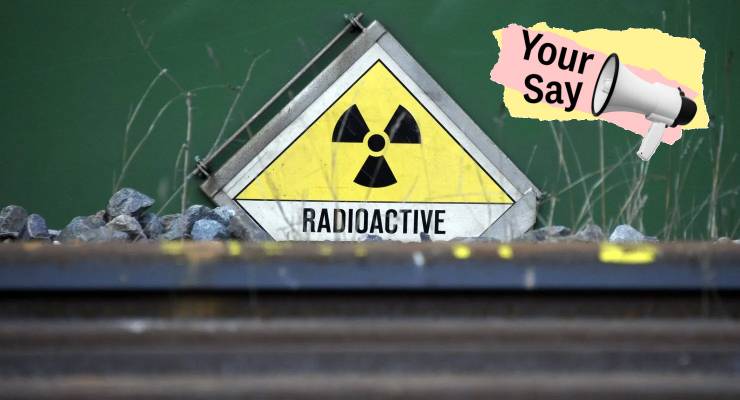
Dr Geoff Bower writes: David Hardaker’s article “AUKUS nuclear dump deal decades in the making by players with prescience” on the lack of transparency of the AUKUS agreement(s) is well presented and profoundly worrying. To conflate the Lucas Heights storage facility with what would be required for us to store waste from reactors using weapons-grade uranium is insane, immoral and empty-headed. But this makes perfect sense if it was part of Scott Morrison’s secret arrangements with the US military-industrial complex and our old friends from the British empire.
Working with advice from multinational accounting firms and the US Navy admirals in our midst, it would have been logical and predictable. The laws of physics don’t apply in their end-of-days world, I guess.
These Attack-class submarines are really to defend our shipping lines now, are they? China will tremble in its boots at our sabre-rattling I’m sure, as Paul Keating so wryly observed. Maybe in their fevered political imaginations the spent fuel rods from the old Virginia-class subs (that we probably won’t get) will be able to be refashioned into medical radioisotopes and we will become an economic renewable superpower.
Bob Hawkins writes: I was involved, with Access Economics, in the economic modelling of the possible net benefits of the Pangea waste storage project. It seems to me that Hardaker’s analysis glosses over three issues.
First, the provision of long-term storage of high-level waste is an extremely scarce resource. If Australia secured a near monopoly of its supply, it would be able to charge monopoly prices for access to it. If the revenue projections of the Pangea project were to be believed, there was a huge long-term revenue stream here. This amounted to an eye-watering economic return on the initial and ongoing outlays.
Second, from a global perspective, the alternative locations for long-term secure storage had a substantially higher risk of political failure. When Pangea was mooted, the main alternatives appeared to be in Argentina or South Africa, neither of which offered long-term political stability. Europe was too crowded and offered only limited areas with suitable geological stability. From a global perspective, Australia probably offered the least-worst long-term solution. The same may apply in the AUKUS context. If we were to invest in a facility to store high-level nuclear waste, we should probably accept waste from sources other than AUKUS.
Third, while I haven’t followed things closely, it seemed to me that the location proposed by Pangea was subsequently shown to be unsuitable geologically because of the occurrence of (undisclosed) artesian aquifers. This points to the need for careful scrutiny of the scientific underpinnings, as well as the socioeconomic analysis.
As with climate change, nuclear waste facilities operate over a timeframe that rivals the 60,000 years of Aboriginal stewardship of this continent. While we have so far shown ourselves as a society to be utterly inept in making decisions with so long a perspective, it seems to me to be a case that may justify overriding concerns of Traditional Owners and left-leaning politicians. However, it does not justify the current government’s seeming instinct to sweep difficult issues under the carpet.
Dr Eileen Whitehead writes: I was appalled by the fact that the Labor Party continued with the purchase of nuclear-powered submarines at a cost of $368 billion (at least) and then the small print of the deal was that we were then expected to become a dump for US and UK nuclear waste.
Over my dead body might seem rather glib, but nothing could be closer to the truth.
Christine Hunter writes: Is it or is it not a democratic right to know exactly what an elected government would like to do before it does it? Otherwise please advise the population Australia is no longer a democracy.
Ian Helyar writes: Any honest estimation of cost can never be provided (“AUKUS’ nuclear waste dump is the secret no-one talks about. So what’ll it cost?”). Our government couldn’t even guess over the timeline of storage what the cost will be. To even ask the question on the right to know the cost is hilarious.
Michele Madigan writes: The government should be forced to disclose the full cost of a nuclear waste dump — but will it know it?
While watching the excellent John Farnham documentary Finding the Voice the other night I was again struck by how people in former times were prepared to march and protest against the dangers of nuclear power. And now that times are as dangerous/more dangerous, there is not the same level of concern — at least not yet.
Stephen Dunn writes: Latest technology non-nuclear-powered submarines are what’s needed to defend Australia. And they are available in greater numbers at probably 10% of the cost of AUKUS, with no nuclear waste issues. Simple really. Let’s do a Dan Andrews and cancel Morrison’s commitment.








I suspect the end-game of Aukus all along, was for Orstraya to get the nuclear waste without the submarines attached.
interesting points Bob
one – yes, storing nuclear waste should come at a huge premium, but no doubt our spineless government will provide the service at a huge discount to our “allies” … after paying private companies massive amounts of money to construct it, for which they won’t pay tax
two – with the way world is going, to move forward with a nuclear waste dump on the assumption that Australia will still be politically stable in (say) 30 years time is, sadly, overly optimistic in the extreme
three – our governments have real difficulties with listening to experts (as you yourself note) – so the chances any Australian government will site the nuclear waste dump in the safest place possible, rather than somewhere politically expedient, is close to zero … meaning we’ll end up with a ticking time bomb
The problem with any necessarily long-term storage of dangerous material is human beings. We don’t “do” long term.
We’re talking ensuring thousands of years of safe storage, yet we know already what will happen. A contract would be awarded to a corporation promising hand-on-heart to be a trustworthy custodian. They would make huge profits accepting the waste and neatly stack it away in the approved holes.
Then once the holes have been filled in, that company will be sold to a dodgy shelf company who will proceed to declare bankruptcy either sooner or later (depending on how long the taxpayers will be subsidising them for while they hide the fact that they aren’t actually doing the maintenance we’re paying them for) and leave an ecological and probably human disaster behind them.
Cue enquiry and bring out the wilted lettuce leaves for the ceremonial flogging…
Stop worrying, it’s not our issue. The issue belongs to those who will be born in five and ten years time. They will have to decide where to dump the High Level Nuclear Waste (HLNW) from the subs for the hundreds of years it will take for it to become safe to work with. Then the kids of the kids of the kids yet to be born will need to worry about how to either reprocess it or dispose of it. Stop worrying…
It is safe enough to reprocess fuel soon after extraction. In the EBR2 project, the recycled fuel went back into the same reactor within months. It isn’t storage that is a problem, it is that the pro-fossil movement has been disrupting installations of the fast neutron reactors that are to burn up all of the recycled fuel.
So why aren’t the US and Britain not doing that already?
Good question! US, Britain, France and Japan all had fast reactor programs in various stages of maturity. When the cost of buying and enriching raw uranium became cheaper than recycling, the governments capitulated to political pressure and closed down their fast reactor programs. Without a coal lobby, Russia continued, and it is their designs that the Chinese are now developing to replace their slow neutron designs by mid century.
You guys are are being wilfully ignorant. It is straight forward engineering to recycle used nuclear fuel. Burial of the tiny quantity of fission products is an almost trivial exercise. Nuclear electricity is desperately needed for the total replacement of fossil fuels. All of your fears are nothing compared to the horrible reality of worsening climate change. Which side are you on?
tears in the eyes, laughing emoji
We already have an enormous fusion power plant in the sky. Fission reactors are a very expensive way of providing electricity, with reliably huge cost overruns and a certainty that they will take decades longer to build than the glossy brochure claims.
I’m not an effigy to be burnt on cracker night, but I do have knowledge of radioactivity. The daughter products of fissile materials have a half life of up to 250,000 years, not trivial in any way.